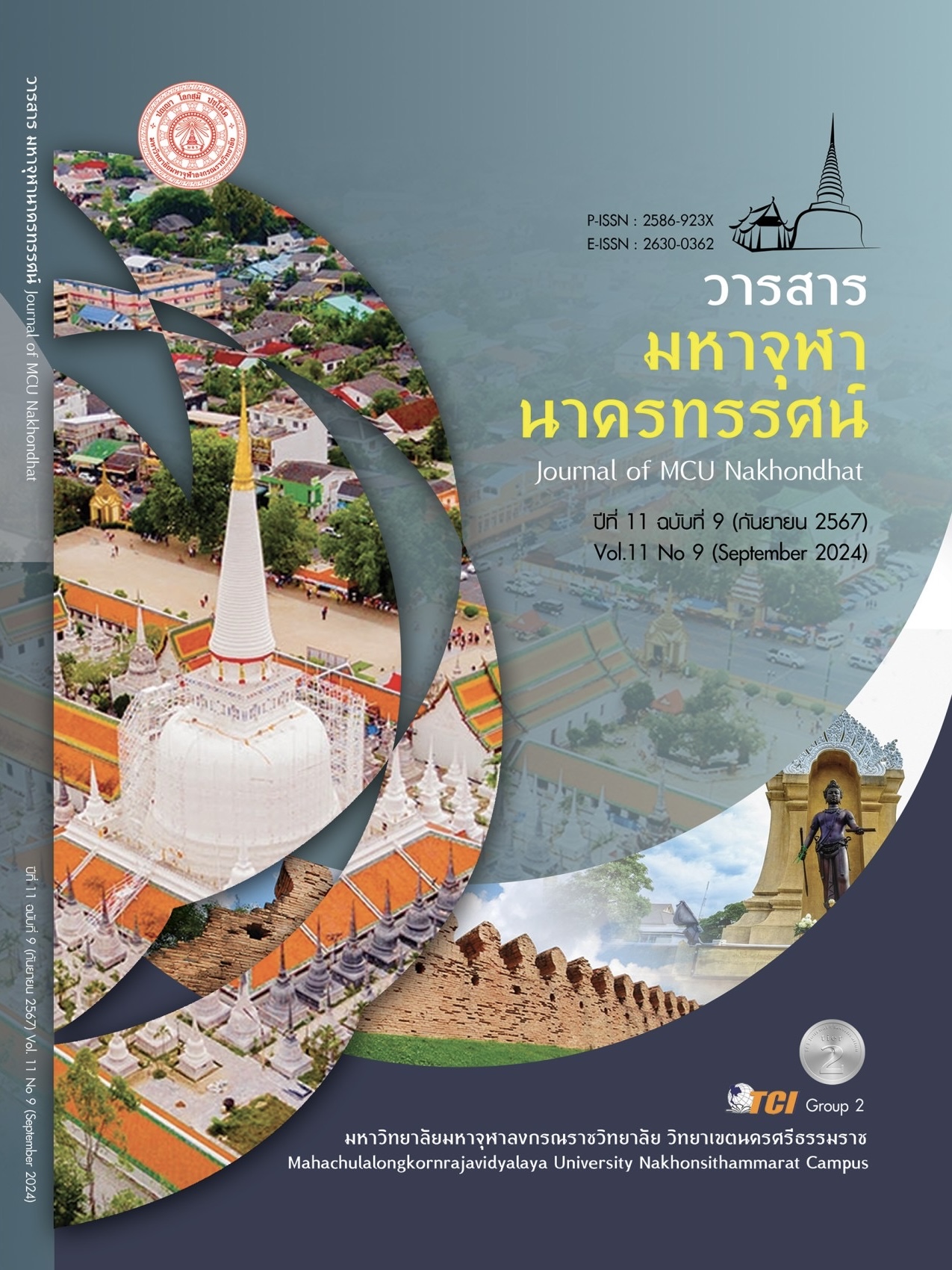BUDDHIST EMOTIONAL INTELLIGENCE AND WOMEN'S LEADERSHIP EMPOWERMENT
Main Article Content
Abstract
This article aims to present the integration of Buddhist emotional intelligence with empowerment in female leadership. The study reveals that developing Buddhist emotional intelligence encompasses learning and improving the relationship between emotions and responses to various situations with mindfulness, both towards one's own emotions and those of others. This is achieved through mindfulness training and understanding one's feelings and thoughts, allowing for effective emotional management and problem-solving in alignment with reality. Practically, Buddhist emotional intelligence emphasizes mindfulness in relation to one's environment and the reality of situations. Buddhist principles are recognized as practices that promote mental and emotional well-being. Empowering female leadership should focus on enhancing understanding of leadership roles and responsibilities, communication skills, decision-making, problem-solving, and effective team management. This approach leads to reliable outcomes and fosterscontinuousorganizational growth in a positive direction. The integration of emotional intelligence developed through meditation and Buddhist principles with female leadership empowerment enhances the ability to control one's own and others' emotions, improve understanding of leadership roles, and strengthen communication and team leadership skills. The results from this integration provide a crucial approach for effective and sustainable development both at the individual and organizational levels
Article Details

This work is licensed under a Creative Commons Attribution-NonCommercial-NoDerivatives 4.0 International License.
References
กาญจนา เหมะรัต และคณะ. (2555). รูปแบบการเสริมพลังอำนาจการพยาบาลผู้ป่วยจิตเภทในสังคมเมือง. วารสารพยาบาลจิตเวชและสุขภาพจิต, 26(3), 81-86.
บรรจง อมรชีวิต. (2558). พุทธวิธีคิดวิเคราะห์ด้วยโยนิโสมนสิการ การคิดเพื่อนำไปสู่ปัญญาวิมุติ. กรุงเทพมหานคร: ภาพพิมพ์.
ประเวศ วะสี. (2546). ยุทธศาสตร์พระพุทธศาสนากับการพัฒนาประเทศไทย. กรุงเทพมหานคร: มูลนิธิโกมลคีมทอง.
พจนานุกรม ฉบับราชบัณฑิตยสถาน. (2554). ผู้นำ. เรียกใช้เมื่อ 20 พฤษภาคม 2567 จาก https://dictionary.orst.go.th
พรพรหมพรรณ บุญโคกล่าม และคณะ. (2566). ภาวะผู้นำของผู้บริหารสถานศึกษาสตรีที่ส่งผลต่อความสุขในการทำงานของครูและบุคลากรทางการศึกษาสังกัดสำนักงานเขตพื้นที่การศึกษามัธยมศึกษาจันทบุรี ตราด. วารสารมหาจุฬานาครทรรศน์, 10(5), 142-152.
พระปวิทัย วชิรวิชฺโช. (2018). ประโยชน์ของการฝึกสมาธิแนวพุทธเซน ในการพัฒนาความฉลาดทางอารมณ์ ศึกษากรณีผู้ปฏิบัติธรรมชาวฝรั่งเศส. ธรรมธารา, 1(1), 186-200.
ภารดี อนันต์นาวี. (2552). หลักการ แนวคิด ทฤษฎี ทางการบริหารการศึกษา. ชลบุรี: มนตรี.
มติชนสุดสัปดาห์. (2559). ฉัตรสุมาลย์: เสวนาเรื่องบทบาทสตรีฯ. เรียกใช้เมื่อ 20 พฤษภาคม 2567 จาก https://www.matichonweekly.com/column/article_1468
รสสุคนธ์ วาริทสกุล. (2560). กลยุทธ์การเสริมพลังอำนาจในผู้ป่วยโรคไตเรื้อรัง. วารสารพยาบาลสภากาชาดไทย, 10(1), 1-12.
วรรณดี เกตแก้ว. (2552). การศึกษาองค์ประกอบคุณลักษณะของผู้นำสตรีทางการศึกษาในภาคใต้. วารสารศึกษาศาสตร์, 20(2), 45-58.
วันทนีย์ วาสิกะสิน. (2553). สังคมสงเคราะห์แนวสตรีนิยม: ทฤษฎีและการปฏิบัติ. (พิมพ์ครั้งที่ 2). กรุงเทพมหานคร: มหาวิทยาลัยธรรมศาสตร์.
วิชญพงศ์ ไชยธิกุลโรจน์ และคณะ. (2564). ผู้บริหารสถานศึกษากับการพัฒนาตัวบ่งชี้ความฉลาดทางอารมณ์และสังคม. วารสารการวัด ประเมินผล สถิติ และการวิจัยทางสังคมศาสตร์, 4(2), 17-26.
วิทย์ วิทศทเวทย์ และเสฐียรพงษ์ วรรณปก. (2562). พระพุทธศาสนา ม. 4 กลุ่มสาระการเรียนรู้สังคมศึกษา ศาสนา และวัฒนธรรม ตามหลักสูตรแกนกลางการศึกษาขั้นพื้นฐาน พุทธศักราช 2551. (พิมพ์ครั้งที่ 8) . กรุงเทพมหานคร: บริษัท อักษรเจริญทัศน์ อจท. จำกัด.
วิษณุ เครืองาม. (2554). เสรีภาพในการแสดงความคิดเห็น. วารสารนิติธรรมศาสตร์มหาวิทยาลัยธรรมศาสตร์, 13(1), 570-571.
สมเด็จพระพุทธโฆษาจารย์ (ป. อ. ปยุตฺโต). (2559). พุทธธรรม ฉบับเดิม. (พิมพ์ครั้งที่ 31). กรุงเทพมหานคร: โรงพิมพ์พระพุทธศาสนาของธรรมสภา.
สมเด็จพระพุทธโฆษาจารย์ (ป. อ. ปยุตฺโต). (2561). พจนานุกรมพุทธศาสตร์: ฉบับประมวลศัพท์. (พิมพ์ครั้งที่ 31). กรุงเทพมหานคร: โรงพิมพ์มหาวิทยาลัยมหาจุฬาลงกรณราชวิทยาลัย.
สมเด็จพระพุทธโฆษาจารย์ (ป. อ. ปยุตฺโต). (2564). การศึกษาเพื่อพัฒนาอารยธรรมให้สมนาม สยามสามไตร ศึกษา 3 พัฒนา 4. (พิมพ์ครั้งที่ 9). กรุงเทพมหานคร: บริษัท พิมพ์สวย จำกัด.
สมบูรณ์ วัฒนะ และคณะ. (2566). การบูรณาการพระพุทธศาสนาเพื่อสร้างคุณค่าตามคติสุวรรณภูมิ กรณีวัดพระปฐมเจดีย์. ธรรมธารา, 9(1), 80-111.
สุนี ไชยรส. (2554). เฟมินิสต์ ประชาธิปไตยและสิทธิมนุษยชน: การต่อสู้บนเส้นทางแห่งความเสมอภาค. กรุงเทพมหานคร: เดือนตุลา.
กัลยาณมิตร. (2560). หลักธรรมสำคัญในพระไตรปิฎก. เรียกใช้เมื่อ 20 พฤษภาคม 2567 จาก https://kalyanamitra.org/th/article_detail.php?i=14327
Burn, J. M. (1978). Leadership. New York: Harper and Row.
Daniel G. (1998). Working with Emotional Intelligence. New York: Bantam Books.
Durin, A. J. (2004). Leadership Research Findings, Practice, and Skills. New York: Houghton Mifflin.
Fisher, H. (2010). The first sex: The natural talents of women and how they are changing the world. New York: Ballantine Books.
Goleman, D. (1995). Emotional Intelligence: Why It Can Matter More Than IQ. New York: Bantam Books.
Ruchaneeya L. (2565). ความฉลาดทางอารมณ์-สิ่งสำคัญที่ผู้นำต้องมี. เรียกใช้เมื่อ 20 พฤษภาคม 2567 จาก https://blog.happily.ai/th/emotional-intelligence-important-key-for-leaders-th/
Salovey, P. & Mayer, J. D. (1990). Emotional Intelligence. Imagination, Cognition, and Personality, 9(3), 185-211.
Solovic, W. S. (2007). The girl's guide to power and success. New York: AMACOM.


